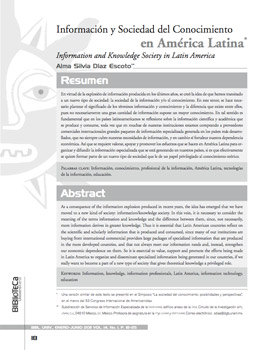Information and Knowledge Society in Latin America
DOI:
https://doi.org/10.22201/dgb.0187750xp.2011.1.122Keywords:
Información, conocimiento, profesional de la información, América Latina, tecnologías de la información, educaciónAbstract
As a consequence of the information explosion produced in recent years, the idea has emerged that we have moved to a new kind of society: information/knowledge society. In this vein, it is necessary to consider the meaning of the terms information and knowledge and the difference between them, since, not necessarily, more information derives in greater knowledge. Thus it is essential that Latin American countries reflect on the scientific and scholarly information that is produced and consumed, since many of our institutions are buying from international commercial providers large packages of specialized information that are produced in the more developed countries, and that not always meet our information needs and, instead, strengthen our economic dependence on them. So it is essential to value, support and promote the efforts being made in Latin America to organize and disseminate specialized information being generated in our countries, if we really want to become a part of a new type of society that gives theoretical knowledge a privileged role.Downloads
References
Aboites, Hugo. Tratado de Libre Comercio y Educación Superior: el caso de México: un antecedente para América Latina. Perfiles educativos, 2007, vol. 29, no. 118, p. 25-53.
Castells, Manuel. La era de la información: economía, sociedad y cultura. Madrid: Alianza, 1997.
David, Paul y Foray, Dominique. Una introducción a la economía y a la sociedad del saber. Revista internacional de ciencias sociales, marzo, 2002, no. 171, p. 6.
Drucker, Peter. The Age of Discontinuity. New York: Harper & Row, 1969. 402 p. DOI: https://doi.org/10.1016/B978-0-434-90395-5.50005-5
----------. The Age of Social Transformation [en línea]. The Atlantic Monthly, 1994, vol. 273, no. 11. [Consulta: 2 septiembre 2009].
----------. Post-Capitalist Society. usa: Harper Collins, 1999.
Morín, Edgar. La mente bien ordenada. Barcelona: Seix Barral, 2000. 182 p.
Negri, Antoni, Hardt, Michael. Empire. Massachussets: Harvard University, 2000. 478 p.
Olivé, León. La cultura científica y tecnológica en el tránsito a la sociedad del conocimiento. Revista de educación superior, octubre-diciembre, 2005, vol. 34, no. 136, p. 52.
----------. Los desafíos de la sociedad del conocimiento: cultura científico-tecnológica, diversidad cultural y exclusión. Revista científica de Información y Comunicación, 2006, no. 3, p. 6.
Quintana Martínez, Diosdado. “Una visión de la actual crisis integral del capitalismo” [en línea]. Contribucio- nes a la Economía, feb. 2009. <http://www.eumed.net/ ce/2009a/> [Consulta: 2 septiembre 2009].
Rendón, Miguel Ángel. Bases teóricas y filosóficas de la Bibliotecología. 2a ed. México: cuib-unam, 2005, p. 12. DOI: https://doi.org/10.22201/cuib.9703226795p.2005
Shultz, Theodore. Investment in Human Capital. Ame- rican Economic Review, 1961, vol. 51, no.1, p. 1-17.
Wallerstain, Immanuel. La trayectoria del poder estadounidense. New Left Review, septiembre-octubre, 2006, no. 40, p. 71.
Webster, Frank. La sociedad de la información revisitada. Biblioteca Universitaria, enero-junio, 2006, vol. 9, no. 1, p. 22-40.

Downloads
Published
How to Cite
Issue
Section
License
Descargar el formato de Cesión de derechos en formato PDF:
Formato de Cesión de derechos
Imprímalo y una vez que lo haya firmado envíenoslo vía fax o por correo a:
Revista Biblioteca Universitaria:
Dirección General de Bibliotecas y Servicios Digitales de Información de la UNAM
Departamento de Publicaciones
Edificio de la Biblioteca Central, 11o Piso,
Circuito Interior, Ciudad Universitaria, 04510 México, D.F.
Tel 5622-1616,
Fax: 5622-1601,






